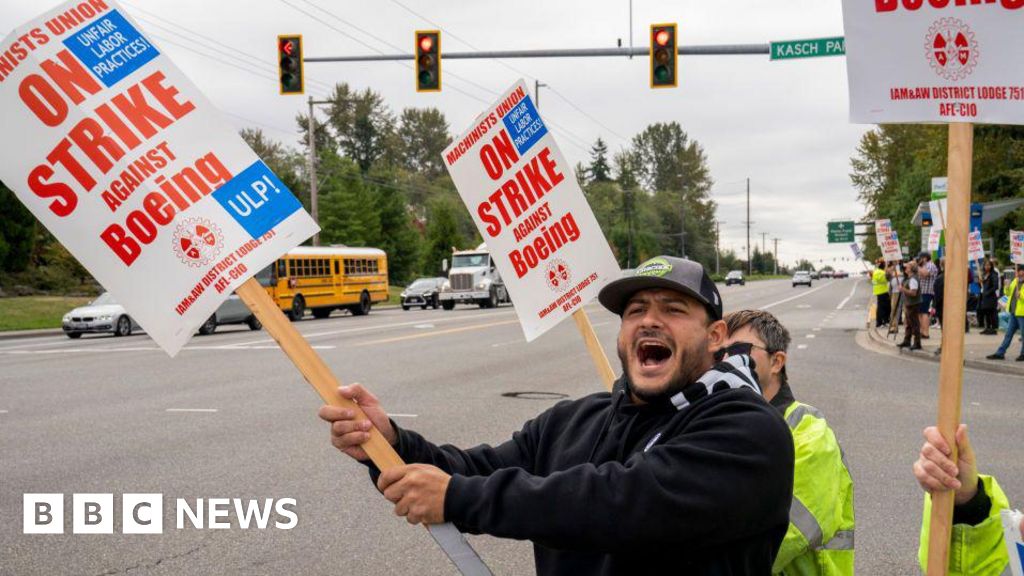Boeing warns of job losses and makes spending cuts after strike

Boeing is making immediate spending cuts and says it may temporarily lay off staff, as it grapples with a strike by more than 30,000 workers in the US.
The cuts include a freeze on hiring, “significant reductions” of spending at suppliers, and a ban on non-essential and first-and business-class travel, including by senior executives.
Boeing said the moves were aimed at preserving cash during the industrial action stand-off that executives have warned will worsen the firm’s already perilous financial state.
“Our business is in a difficult period,” chief financial officer Brian West wrote in a letter to staff.
“This strike jeopardizes our recovery in a significant way and we must take necessary actions to preserve cash and safeguard our shared future,” he added.
The strike at Boeing began on Friday, hours after workers in Washington State and Oregon rejected a new four-year contract offer.
The proposed deal promised a 25% pay increase over four years and improvements to terms and conditions, and had been recommended to the workforce by union leaders.
Boeing itself described the offer as “historic”, but the deal was overwhelmingly voted down by employees.
Talks are due to re-start on Tuesday, according to the union.
In the meantime factories building the 737 Max, the 777 and the 767 freighter have all been affected by the walk outs.
Boeing has asked suppliers to halt shipments of most parts for those planes, suspended non-essential capital spending and frozen spending on consultants.
The company, which employs more than 170,000 people, the majority of whom are based in the US, said it was also “considering the difficult step of temporary furloughs for many employees, managers and executives in the coming weeks”.
Boeing has said the impact of the strike will depend on its duration, but analysts say an extended stoppage could cost the firm and its suppliers billions of dollars.
The last strike at Boeing in 2008 lasted about eight weeks.
Major ratings companies have warned that the stand-off could lead to a downgrade of the aerospace giant’s credit rating, making it more expensive for the firm to borrow.
The company has been dealing with historic losses. Production has slowed as the firm responds to concerns about the quality of its manufacturing.
Separately, Boeing has agreed to pay $150m (£126m) to Brazilian plane-maker Embraer over its decision to walk away from talks about a possible merger in 2020.
Related
Why investing in women is a vital next step for…
Get Nadine White's Race Report newsletter for a fresh perspective on the week's newsGet our free newsletter from The Independent's Race CorrespondentGet our fre
Business secretary signals major shift on electric car policy to…
In a determined effort to retain Nissan’s manufacturing presence in Britain, Business Secretary Jonathan Reynolds has vowed to implement “substantial c
Joint Statement: Business Secretary and Fujitsu Services Ltd
Business and Trade Secretary Jonathan Reynolds today (Friday 7 March) met chiefs for Fujitsu in Tokyo to begin talks over the cost of redress for victims of th
UK foreign secretary backs multilateral defence funding for Europe
UK foreign secretary David Lammy has said that a new multilateral fund will be needed to secure Europe’s defence as he confirmed that Britain is “open to”













